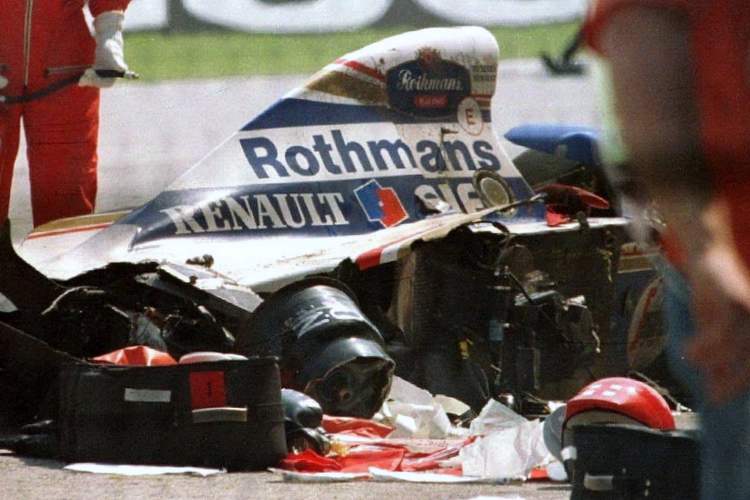In the world of motorsport, although fatalities still occur, they are much less common than in previous decades. Modern Formula 1, considered the pinnacle of motorsport, is unquestionably the safest of all time. However, there was a time when this was not the case. Every year on Labor Day, also known as Senna Day, we are reminded of the tragic deaths of Roland Ratzenberger and Ayrton Senna during qualifying at Imola in 1994. These two drivers, along with many others who have been forgotten by most people, had their lives cut short in pursuit of their careers in motorsport.
On May 1, 1994, two Formula 1 drivers, one Brazilian and one Austrian, lost their lives in Italy. Despite their contrasting levels of fame, wealth, and success in the sport, their deaths occurred in just a few devastating days. Senna’s fatal accident in the Adrian Newey-designed Williams FW16 was the result of a failure that an Italian court attributed to a hastily adapted steering column. Another driver, Jacques Villeneuve, shared his perspective on the incident, stating that Senna simply had bad luck as a piece of the wheel suspension penetrated his helmet. Villeneuve also mentioned Felipe Massa’s luck in a similar incident in Hungary in 2009, where a spring narrowly missed his head.
Although Massa survived his terrible accident, others were not so lucky. Jules Bianchi tragically lost his life when his Marussia collided with a safety vehicle, and the death of Anthoine Hubert during a Formula 2 race supporting the 2019 Belgian Grand Prix once again shook the motorsport community. Villeneuve highlighted the changes in safety measures for drivers over the years. He noted that enhanced car safety allows ordinary drivers to be competitive without fully understanding the limits or dangers involved. In the past, drivers had to repeatedly navigate the corners to get a sense of the track’s nuances, but this practice has become obsolete. Despite these changes, Villeneuve emphasized that modern Formula 1 has its own merits and should not be overshadowed by nostalgia for the past.
Advancements in safety have significantly increased the life expectancy of race drivers, allowing people of all ages to participate in the sport. As a result, there has been an increase in young drivers entering the world of racing. However, one must consider the hypothetical scenario of multiple deaths occurring every week among young drivers. If that were the case, undoubtedly, it would shatter the dreams of countless parents who aspire to see their children succeed in racing.
Reflecting on the dark period of motorsport, Villeneuve recalled: “Back then, it was considered a success to complete the season without any mechanical failures. And it was a relief if you could survive. Nowadays, it’s surprising if you don’t even suffer a minor injury! That’s how they have become much safer while maintaining their incredible speed,” said the former 1997 Formula 1 world champion.
When Jacques was just ten years old, his father, the legendary Gilles Villeneuve, tragically lost his life during the qualifying session for the 1982 Belgian Grand Prix at Zolder. He was driving for Ferrari on that fateful day.
Reflecting on the events that unfolded at Imola in 1994 and the devastating consequences of the accidents involving Ratzenberger and Senna, Villeneuve expressed: “That particular weekend was the most emotionally painful, as it resulted in the greatest loss of human lives.”
Regarding the premature loss of his father Gilles, JV shared: “The toughest weekend for me was when my father passed away. So, it’s hard for me to focus on anything that may have been negative for F1. Ultimately, that’s irrelevant. What truly matters is the well-being of those left behind.”
“We should not waste our energy worrying about the future of F1. It’s not a living entity. F1 is a business. Our concern should be directed towards those who are grieving and those who have been affected,” Villeneuve stated.
© 2024
Portugal wins Eurocup final in thrilling fashion
Last Sunday, the Portuguese national football team clinched the Eurocup title in an exciting match against Germany. The game, which took place at Wembley Stadium in London, was full of tense moments and twists.
The match began with Germany taking the lead early in the first half. However, Portugal didn’t falter and managed to equalize before halftime. The tying goal was scored by Cristiano Ronaldo, who became the competition’s top scorer.
In the second half, both teams had several chances to score, but it was Portugal who managed to shake the nets again. The winning goal was scored by Diogo Jota, in the 80th minute of the second half. The Portuguese fans present at the stadium went wild with the goal and began to celebrate the title in advance.
However, in the final minutes, Germany pressed and managed to tie the game. It seemed like the match would go into extra time, but in injury time, Cristiano Ronaldo scored another goal and secured Portugal’s victory.
With the result, Portugal won its second Euro Cup title, repeating the feat of 2016. The Portuguese national team was highly praised by the international press for their determination and team spirit. Cristiano Ronaldo, once again, was the standout player, being crucial to the title win.
Portugal’s victory in the Euro Cup final was celebrated by millions of fans across the country. The streets of Lisbon were filled with a true celebration, with fireworks, honking horns, and festivities. The national team coach, Fernando Santos, was also highly praised for his strategy and how he motivated the players.
Now, the Portuguese national team is preparing for the upcoming challenges, with the expectation of maintaining their good performance and winning more titles in the future. The next major tournament will be the World Cup, which will take place next year. Portugal enters as one of the favorites for the title, and fans are eager to see what the team can achieve.










